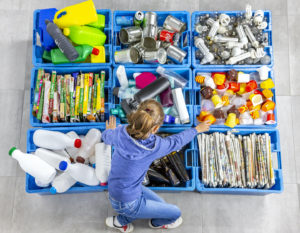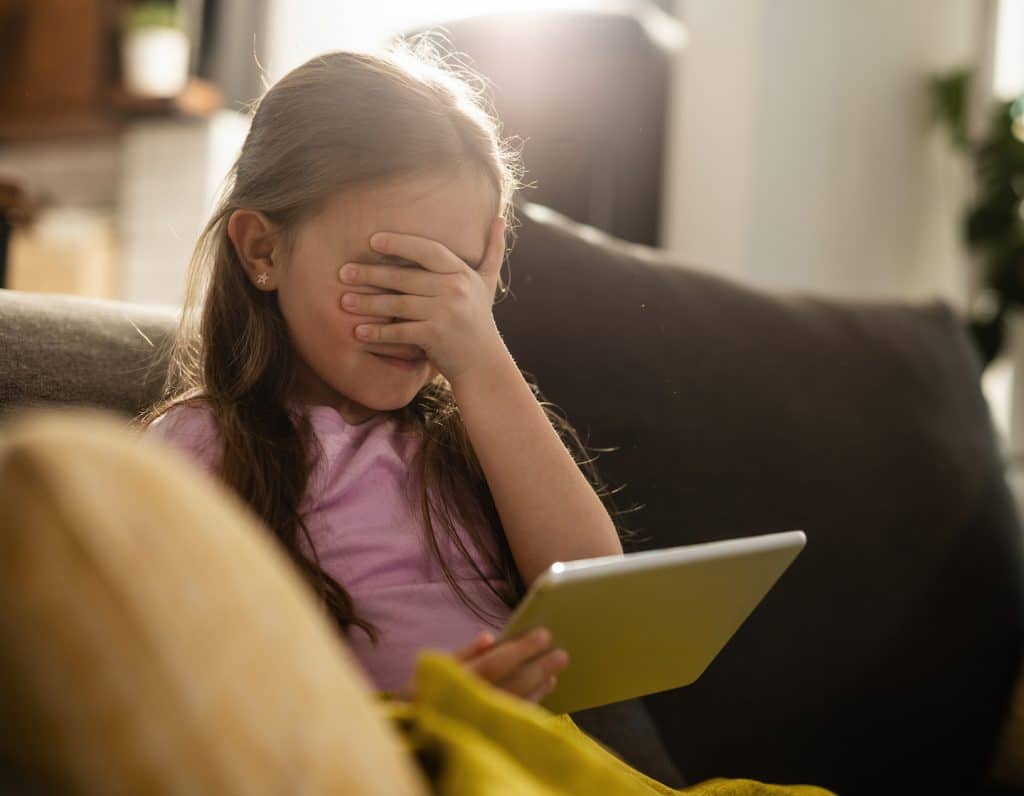




Every parent’s nightmare is to discover that their child – especially a young child – has viewed porn. Here’s how to educate and empower when talking to kids about porn and sexting.
It’s a convo potentially more awkward than the birds and the bees: ‘Our kids grow up way too fast’ is a comment we hear more and more frequently in this day and age. It’s all around us. In a world where kids are being sexualised earlier and earlier as a direct result of sexual material on TV, in movies, surfing the net, in music, in magazines, and even on the sides of buses, it’s up to parents to take action.
Read more: Parent Resources: Guide to Kids Internet Safety, Social Media & Screen Time
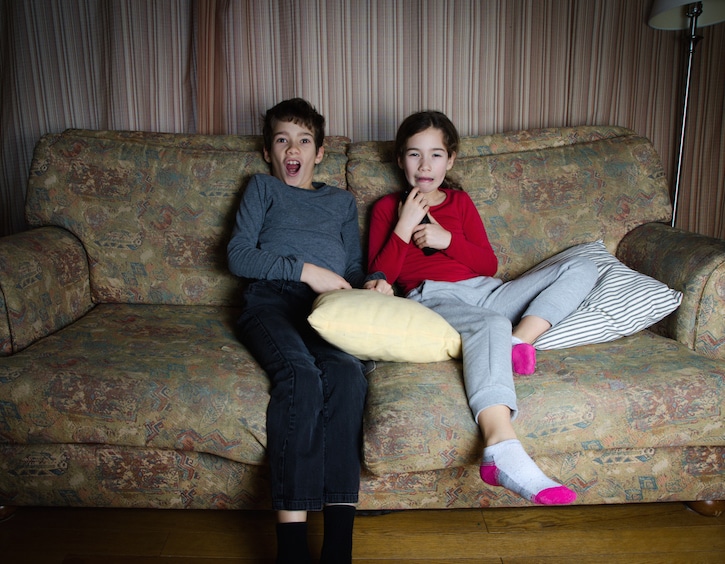

Research indicates that on average children first encounter porn at age 11 (!). Every parent’s nightmare is to discover that their child – especially a young child – has viewed porn. Maybe they clicked onto something on YouTube. Maybe their friend dared them to Google the word “sex”. Because it is a difficult conversation, we tend to put it on the back burner, but sadly we are only fooling ourselves, because research shows that kids from a very early age may accidentally or intentionally be exposed to material that is sexually explicit, uncensored, often inaccurate and potentially harmful.
Read more: My Kid Found Porn Online: Here’s What I Wish I’d Done Differently
This is why it’s so important to have that conversation about porn, no matter how uncomfortable you might feel, because one way or another, your kids are going to see it, says counsellor and psychotherapist Fiona Maher O’Sullivan from Incontact Counselling & Training, which specialises in professional counselling and psychotherapy for children, teens, couples and families. And studies show pornography definitely has undesirable outcomes and consequences you will want to prepare your child for and hopefully avoid.
“Have an age-appropriate conversation,” Ms. O’Sullivan says. Talk to other parents, and find out if your school has an official stance or approach to porn (yes, many schools have to confront this issue!). The Singapore Media Literacy Council provides some great tips on talking to kids about porn at different ages (they all spell out that it’s not illegal to view pornography, but is illegal to download it in Singapore).
Read more: Talking to Kids About Sex
As a parent, try to minimize children’s exposure to commercial media and kids’ magazines, and find alternatives that they can enjoy. Get your kids involved in sport and other outdoor activities.
Tell your children from a very early age, and often, that they are loved for who they are, NOT for how they look, advises Ms. O’Sullivan. Be open and firm about your family’s personal values, and explain your reasoning to your child.
Other key tips, via Professor Jessica Zurcher: when talking to your kids about porn it’s important to avoid shame-based messaging. Don’t blame or punish your child for encountering pornography, both because it’s perfectly healthy and natural to be curious about sex and sexuality, but also because you don’t want your child to perceive negative consequences from discussing pornography with adults. Instead, thank your child for confiding in you, and try to ask questions and/or encourage a further open dialogue. For instance, you can discuss how everyone’s definition of pornography differs, and there are blurred lines between art, entertainment and titillation. It’s also a great opportunity to talk about body positivity and feeling a sense of agency over their own body.
Read more: Teaching Kids about Consent
Additionally, Professor Zurcher recommends avoiding the ‘third person effect’, or sending the message that ‘good kids don’t encounter pornography.’ If your kids are prepared beforehand to know what’s out there, and they’ve also been made aware of porn’s negative aspects and outcomes, they will feel a truer sense of agency and empowerment.


An Open, Honest and Respectful Relationship is the Key
Ms. O’Sullivan advises that while it’s definitely important to put boundaries on access to the Internet and screens (the app Qustodio earns high marks from parents worldwide), it’s equally key to explain your reasoning openly and honestly to your kids, which in turn can help them feel safe talking to you if they see something inappropriate online.
Dr. Andrew Yee of Singapore University of Technology and Design gave similar advice when we met him at a digital parenting conference earlier this year:
“Is [your child’s] autonomy being respected? Do you think they feel you are being responsive to their feelings? Rule setting should be dependent on discussing and explaining WHY– not simply telling your kids ‘because I said so!’ There’s a difference between setting rules and being a controlling parent.”
In his research Dr. Yee has found that how parents talk to their children – whether in a more open, respectful, “discursive” manner, or in a more authoritarian and top-down manner – can have a huge effect on children’s perceived emotional climate.
Read more: How to have HONEST conversation with your teen
Additionally, Ms. O’Sullivan recommends that parents educate kids that “porn can negatively impact their sexual experiences with partners later on when the time is right, as studies have shown it creates unrealistic expectations of and views on sex and intimacy.”
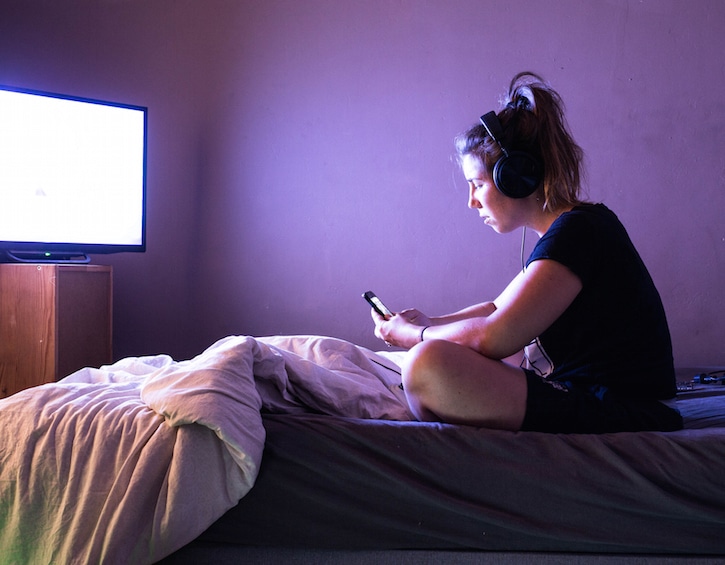

Why Teens are Drawn to Sexting
We were all teenagers once; hormones, testing boundaries, and trying on different self-identities are a universal part of the experience. But the new addition of mobile phones combined with those factors can make for a combustible combination. A variety of recent studies in the US and UK have indicated that about 30% of preteens and teens report receiving “sexts” (sexual text messages) – though there’s speculation that this figure is under-reported, and on the rise. In a 2018 study in the United States, 1 in 3 girls aged 14-to-19 reported all or most of their friends had been asked by a boy to send a sexy or nude photo of themselves.
Particularly worrisome, says Lissy Puno, Counselling Psychologist at International Counselling & Psychology Centre (ICPC), are the potential consequences, which can range from psychological damage to criminal charges, or even suicide in some particularly tragic instances.
“Sexting is one of the issues that’s evolved from having smartphones, but is rooted in the need for belongingness, excitement and risk-taking, along with the peer pressure that all come with the onset of puberty,” says Dr. Puno.
Teens not only receive unwanted sexts, but may also be sending them out without considering the consequences.


The Risks and Consequences of Sexting
And the consequences are myriad and devastating. In the UK, there was a 131% increase in sexting offences registered to the police between 2014 and 2017.
Sadly, there is also a double standard for girls, who might be “slut-shamed” and are more likely to be victimized by a sext going public, whereas for boys possessing nude images or videos is considered an “asset of social capital.” Even worse, victim blaming is often the norm, with girls faulted for not guarding their own sexuality more vigilantly. This leads into a further wrinkle in the issue: of course girls should feel free to be proud of their bodies, and to want to share images and not be ashamed.
According to a 2013 study in the UK:
“International anti-sexting campaigns have positioned ‘sexting’ as a problem affecting young girls who lack vigilance in their uses of social media. The media has tended to dramatize this theme of under-age female risk…The implicit message in this and other anti-sexting narratives is that responsibility for an image lies with its producer/sender not its receiver, resulting in a form of victim-blaming (Hasinoff, 2012) that illustrates what commentators have called ‘slut shaming’ (Albury, 2012). In consequence, strict moral boundaries around girls’ (but not boys’) age-appropriate sexual expression are re-drawn through efforts to prevent sexting practices (Renold and Ringrose, 2011).
“Not only, then are discourses of ‘sexting’ risk aged and gendered, they reproduce moral norms about sexual subjects, constructing girls’ sexuality as a particular problem to be surveilled and regulated. Concerns around ‘sexting’, thus dovetail neatly with the wider social concerns explored in this special issue around girls as the main victims of ‘sexualisation’ and related social harms (Tankard-Reist, 2009). The idea that self-sexualising through sexting images puts girls at moral risk of exploitation works through the age-old sexual double standard that not only positions girls’ sexuality as something pure and at risk of contamination through active desire (Jackson and Cram, 2003) but also positions girls as responsible for protecting the virginal body from hard-wired aggressive male sexuality (Holland et al., 1998).”
Here in Singapore, according to the Media Literacy Council sexting is not illegal (and there are no laws restricting the possession of images). However, if someone sends illicit images to a person under 16, or urges them to perform a sexual act, that child is protected by the Children and Young Person’s Act.
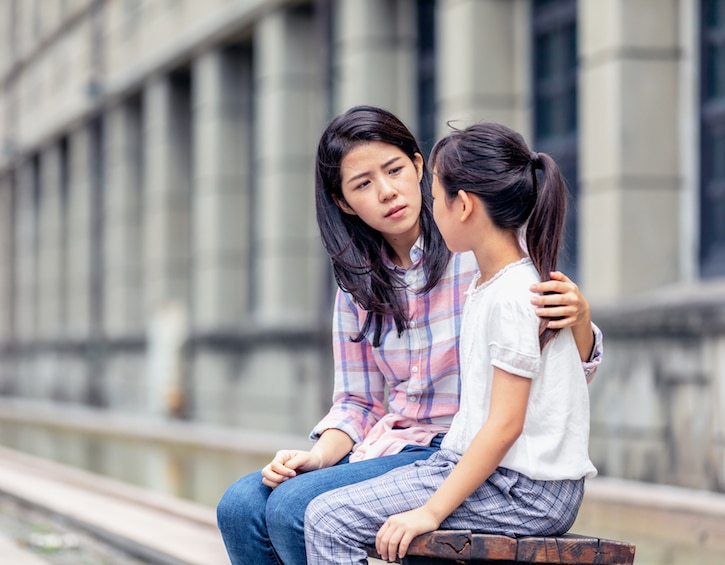

What role parents can play?
As parents, it’s crucial to approach texting in a developmentally appropriate way, says Dr. Puno. For instance if the average age of phone use is at 10 (pre-puberty), parents need to stay on top of knowing how your child is using their phone, and guiding appropriate phone use by setting boundaries and limits from the beginning.
“It’s important to outline negotiable use and non-negotiable use, as well as the consequences of losing phone privileges if these are ignored,” she says.
At the onset of puberty (about 13-15), parents should discuss with their teens the possible issues that can arise from being online (from bullying to being approached by people who aren’t who they claim to be). Parents should also be specific with what kids can and cannot put online (e.g. their address, personal details, etc.).
Parents should know – and warn their kids – that sexting can quickly arise from normal, interesting exchanges to suddenly explicit sexual messages, photos or videos. This is in part due to curiosity on the topic, or extreme peer pressure or bullying. It’s important that parents talk about the consequences of being pulled into a situation where you feel out of control, and remind kids that sending a message to seemingly one person could quickly escalate into a broad public exposure of themselves and their thoughts. In the UK, an app called Zipit (which kids need to install on their own phones) helps “keep flirty chat under control” by helping kids steer the situation and suggesting alternative responses when they’re being pressured to send nude photos. It’s proven to be effective and was cited in recent studies.
Read more: Modelling and Teaching Consent
Once again (we sound like a broken record here!), maintaining a strong connection and an open, trusting relationship with your child is absolutely essential to ensuring they’ll come to you if and when something happens. Remember to reassure your kids that if this happens, you will be available and supportive.
By the time kids hit their mid-late teens (ages 16 to 18), they are growing in independence and maintaining their own friendships and relationships. Ideally if parents and teens have a strong foundation of honesty and open communication, along with modelling of appropriate behavior and a good grasp of healthy sexuality – then kids will know how to engage with presented with texting.
In a recent study, researchers in the UK spoke to 13- and 14-year-olds about the types of support, intervention and sexting education they felt they needed. Some key takeaways: students felt it should be part of their core curriculum (and not just a special school assembly or presentation with scary messaging).
“We only had an assembly, but it only showed us how a girl was bullied after”, a female participant said. “It never told us why not to do it and if it’s illegal”, she added.


Additionally, students were more open-minded and less fearful of texting, viewing certain circumstances for sharing nude photos as “understandable and beneficial,” according to the study’s co-author. For instance, sharing naked images with friends to gain reassurance that their body was normal; sharing a nude photo as an expression of body confidence; or sexting as “a means for creating intimacy and establishing trust within a romantic relationship.” Teens also felt that they had been better prepared to fear texts and harassment from strangers, whereas in fact most bullying and coercion comes from friends and acquaintances.
Finally – and this is a key one for parents – the teens in the study said they did not feel comfortable seeking support from parents and teachers, but rather preferred talking with someone “who you don’t see every day” such as a doctor, guidance counsellor, or peer/mentor.


Taking away their phone or screen time is NOT the answer
As Professor Lim Sun Sun told us in an interview earlier this year, her research has indicated that one major reason kids refrain from talking to their parents about cyber-bullying and other online problems is that they’re “terrified their devices will be taken away from them.” Dr. Lim recommends that total denial is not a good solution; however if your child feels secure and confident that they can avoid that out come, they are apt to feel better about discussing online problems with you more openly.
So what should parents recommend their child does if they receive a sext? Dr. Puno provides the following tips:
- Ignore and disengage from the chat
- Let an adult know
- If it persists, block off contact with people who are engaging in it
- If it persists offline, ask help from an adult you trust, or seek help from professionals or authorities (such as school administrators) who make the behavior stop.
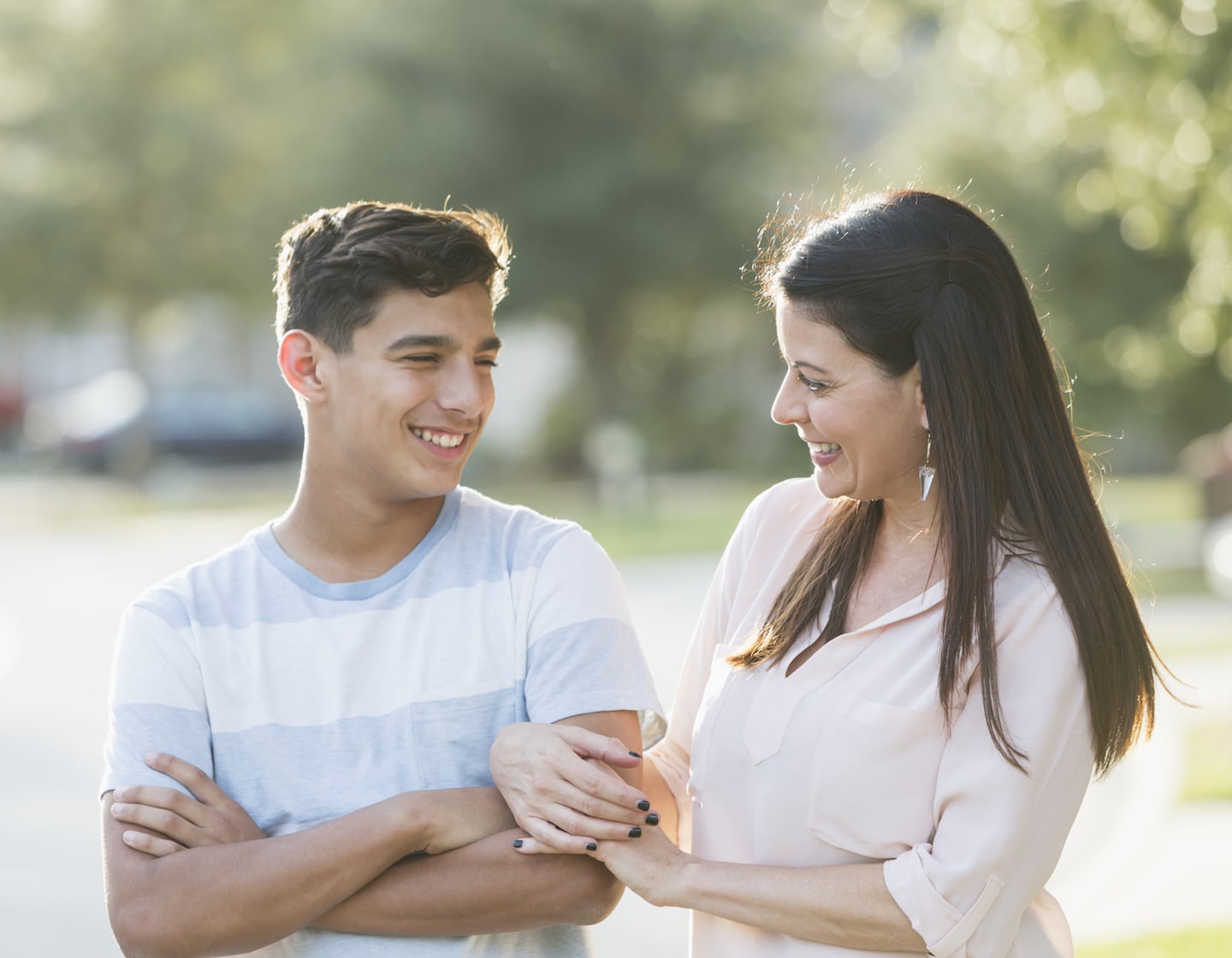

Conclusion: Parental and Family Values are a ‘Super-Protector’
Topics like sexting and pornography both provide the opportunity to talk about your family’s strong identity and core values so as to provide that much-needed sense of belonging to your child. In fact, says Dr. Puno, “Recent research has shown that parent-child connectedness has emerged as a ‘super-protector’ of family life that could potentially protect young people from the many unique stressors and challenges that face them in today’s world.”
In other words, the “emotional environment” of the home – one that is surrounded by affection, warmth, satisfaction, trust, and minimal conflict – has been show to help children make the right choices.
A 2018 study in the United States that surveyed over 1,000 children between ages 10-19 found that parental attitudes influenced teens’ own attitudes and behavior when it came to both sexting and viewing pornography, as well as their treatment of the opposite sex. Importantly, kids who had been spoken to by a parent about these issues, and the emergent #metoo movement, or who played with gender-neutral toys growing up, were more likely to report more favourable attitudes towards gender equality, and to experience less gendered discrimination online.
A strong family bond is seen as a protective factor for the prevention of social and emotional problems, Dr. Puno says, so make every effort to build a positive relationship with your child from the early years of their life to empower them with the skills and strategies that will enable them to navigate difficult life experiences.
Read more:
Talking to Kids about Sex: An Expert’s Age-by-Age Guide on What to Say, and How
10 Ways to Cultivate Safe and Healthy Social Media Habits in Your Kids
7 Surprising Takeaways from Singapore’s Digital Parenting Conference
How to Have Open and Effective Communication with Your Teen
Other online resources:
www.educateempowerkids.org
Parenting for a Digital Future
What’s the Big Deal about Pornography? By Dr. Jill C. Manning
Singapore Media Literacy Council: Information about Sexting, and Specific Tips about Pornography and Talking to Kids about it
In Singapore:
Incontact Counselling, 7 Maxwell Road, #04-04, Annexe B, MND Complex, Singapore 069111, email [email protected] or Tel: (+65) 9238 5141, www.incontact.com.sg
International Counselling & Psychology Centre (ICPC), 360 Orchard Road, #06-08 International Building, Singapore 238869, Tel: (+65) 6734 6463, www.intlcounselling.com. Note that Dr. Puno also offers the workshop “Connected Parents, Thriving Kids, and ‘Getting the Love that You Want’”






 View All
View All





 View All
View All







 View All
View All



